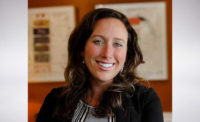Name/Title/Company: Brigitte Busch, global product manager for TXV and refrigerant distributors, Danfoss
Age: 55
Educational Experience: Diplom Ing in aerospace engineering from the TU Munich and a master’s degree in mechanical engineering from Oklahoma State University
What does your day-to-day job entail?
As a global product manager, my daily activities are very diverse. They include supporting the sales team; application engineers; and interfacing with our product team, research and development team, project office, quality teams, and supply chain teams. What I find most enjoyable are customer engagements, supporting the sales team with new opportunities and implementing new ideas to move our industry into a more environmentally friendly direction.
What caused you to/when did you fall in love with engineering?
I have always loved math and science. Even as a child, I was interested in the different aspects of engineering. At age 12, I built a birdfeeder for my dad for Father’s Day. I made drawings of the completed birdfeeder as well as each individual component for the carpenter, so he could cut the different pieces of wood for me. With the pieces cut to size already, I could easily assemble it. I recall the trim carpenter asking me who made the drawings for me. I explained to him I made them myself and he responded that he rarely receives drawings this detailed from the architects, much less a middle schooler. Ultimately, my interests in aerospace led me to engineering school. In fact, my first degree was in aerospace engineering.
What has been the most rewarding/proudest aspect of your engineering career?
I find it most rewarding when we collaborate with customers to improve the function and/or operation of their equipment.
What challenges do women face in this profession? Can you give a personal example? Why aren’t there more women in engineering? How can we increase the number of women in engineering?
I have been extremely fortunate to encounter amazing mentors in this industry and a fantastic work environment. While it is still a male-dominated industry, I have never felt undervalued or not taken seriously.
Every now and then, you face a challenge, which may be unique to being a female in a majority male industry. One event I tend to chuckle about to this day occurred early on in my career. I was one of the design engineers supporting a production line, and a production supervisor from second shift was looking for an engineer to review a deviation. When I offered my assistance, he only said, “No, I need Joe, an engineer, thank you for your offer.” The funny part was that Joe did not have an engineering degree at all but was a designer who had been trained by the engineering team to review minor deviations.
Since I knew Joe was not available, I went out to the production line, found the production line managers, we discussed the deviation, and agreed on a path forward. Just as I was leaving the production line, the supervisor who had asked for Joe arrived. Since we had not met before in person, I introduced myself to him as “Joe’s secretary” and went back to the office. I am not sure what the managers (who both knew me) said to him after I left, but I could definitely see their eyes widen as I made the introduction.
In order to increase the number of females in our industry we need to introduce students to STEM subjects at an early age as well as encourage them to continue in those subjects beyond high school.
Speaking from experience, balancing a demanding career and raising a family is challenging. Supporting working mothers could help companies retain more young women.
How many years have you been active in the engineering sector? What’s changed the most in that time? What’s changed the least?
If we include my time in the university, I have been in engineering for more than 35 years. A lot has changed over the years, including the use of technology and the technology itself. I don’t think any of us imagined being able to 3D print prototypes in our offices three decades ago.
As global product manager, you’re the liaison between different functions at Danfoss, such as application engineering, marketing teams and R&D. What is the most challenging part of your job?
Working in a matrixed environment, which includes different functions, stakeholders, time zones, and cultures is probably the most challenging part of my job. It requires you to constantly adapt to the challenges other team members are facing, understand the problem, assist with the solution, and keep all stakeholders moving in the same direction. It is also this part of my job I enjoy the most.
Your responsibilities include translating future market needs to drive insights with factories and engineering teams. Seeing that you spend a lot of time predicting the future, is there any one technology or innovation the industry should acclimate themselves with that perhaps they’re currently not?
I see simulations as well as artificial intelligence (AI) being used more and more in product development to increase speed to market, support troubleshooting, and reduce product testing.
What drives/motivates you every day?
What motivates me the most is the excellent team I work with and the customers we support. Our challenges are very dynamic, requiring us to constantly think of new ways to address new challenges.
What remains on your engineering bucket list — what do you aspire to do that you haven’t accomplished yet?
I would like to invest more time into mentoring and teaching the next generation about the industry and technology.
What’s one thing no one knows about you?
Few people know that I played bassoon for nine years when I was a teenager. Since bassoon is not the most common instrument for students to play, I was part of two different school orchestras during my high school years and had the opportunity to participate in many performances. I am also a hobby baker!
List any mentors who’ve helped you succeed and describe precisely how they’ve shaped your success.
The largest influence for my love of math and engineering came from my grandfather. My grandfather, a civil engineer, who had his own engineering office, would ask me during summer holidays to help him with engineering drawings and come with him to construction job sites. I was 10 years old when I started following him to the site audits and assisting with drawings.
Throughout my career, I've had many mentors who have helped me along the way — from my first boss, Hank Bierwirth, who really introduced me to the practical and theoretical challenges of the HVAC industry, to engineering managers at our customers, such as Chuck Schlosser. I’ve had many bosses and co-workers who’ve always believed in me and pushed me to believe in myself.
What advice do you have for prospective female engineers considering entering the field?
Don’t be afraid to ask questions. You can learn and do anything if you have a true passion for it and you enjoy what you are doing. There are many opportunities, from marketing to chemistry, in our industry. I firmly believe there are many opportunities for anyone in this field. There is always going to be a demand for skilled personnel.





